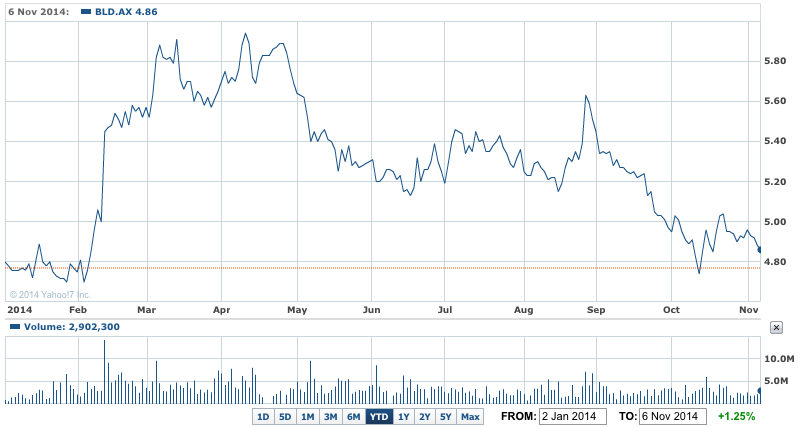Boral (BLD) was an early market favourite to ride the building rebound – its shares peaked at a 52 week high of $5.92 in March, but since then they have steadily slid south, closing yesterday at $4.86. They are still slightly higher than when they started the year.
In fact Boral shares are down 18% from that peak in March, despite improvements in earnings and revenues and quick action by management to attack cost problems.
Boral made a net profit of $173.3 million in 2013-14, an improvement on a $212 million loss suffered during the previous financial year as new CEO Mike Kane put the cleaners through the underperforming building products group.
The company has also been impacted by some thuggish behaviour by building unions and has featured extensively in the Royal Commission into Trade Unions, but that doesn’t explain the relative under performance in the stockmarket.
That’s especially noticeable when compared to its would-be brick partner (subject to ACCC approval) in CSR Ltd which this week revealed a 48% jump in interim earnings, and a share price 30 odd cents away from its 52 peak reached in March and is up nearly $1 from its start of year level.
Boral’s shares are $1.12 lower than its peak, and yet the results don’t support that weakness – the US operations are on the improve, and judging from comments at yesterday’s AGM, the outlook is for another good year.
BLD YTD – Boral upbeat

There was perhaps too much concentration at yesterday’s AGM on the wet weather in the first quarter on the East Coast of Australia which impacted operations in its construction, materials and cement products business, but the weather has improved since then and the long range forecast is for dry conditions (and near El Nino like weather) to continue well into early 2015.
Mr Kane has told shareholders more heavy rain could buffet earnings in its construction, materials and cement division during the rest of 2014-15.
“Expectations could be dampened if we are unable to realise potential property sales and some level of price increase in this very competitive market, and if we experience extended periods of adverse weather," he said.
But, he added that Boral expected to more than double earnings in its building products division in 2014-15, which made $8 million in earnings before interest and tax in 2013-14, up from a $40 million loss the previous year.
In its gypsum (plasterboard) joint venture, USG Boral underlying revenue was up 19% to $1.1 billion and underlying EBIT was up 23% to $102 million for the eight months of the 2014 financial year it was 100% owned by Boral.
"However, as it will be a full 12 months of 50% equity accounted earnings from the joint venture, the division will contribute lower earnings to the Group compared to FY2014,” Mr Kane said.
The US business moved into profits in the final quarter of the 2014 year and Boral expects that improvement to continue this year.
"We expect the US division to report a significantly improved result in FY2015 as the market recovery continues, eliminating losses to deliver a broadly break-even EBIT result. This is contingent, though, on US housing starts reaching 1.1 to 1.2 million starts for FY2015, which is in line with current market forecasts,” Mr Kane told the AGM.
Looking at 2015, Mr Kane told shareholders: “In FY2015 we continue to expect ongoing strong results from Construction Materials & Cement, as well as improvements from both the Building Products and Boral USA divisions and improvements in the underlying USG Boral business. We anticipate return on funds employed to improve, despite the shift to equity accounting Boral’s 50% interest in the Gypsum joint venture.
"We continue to face significant inflationary headwinds, including rising energy and labour costs, so it remains imperative that we continually manage costs down, particularly in Australia. We must also try to capture price in the market place to help offset inflationary pressures, which we have struggled to achieve in some divisions in FY2014.
"The Group’s outlook for FY2015 remains positive and we are working to fill any volume shortfalls with improvement initiatives and additional property sales,” Mr Kane said.




